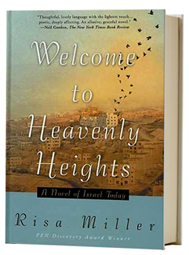




 Settling By Neil Gordon Published: Sunday, February 2, 2003 New York Times
''ONE thousand B.C.E., King David, sweet singer of Israel, bought the heart of Jerusalem from Aravnah the Jebusite. . . . Three thousand years later his descendants were still protecting the investment.''
Among the descendants of King David introduced in this passage from the prologue of ''Heavenly Heights,'' Risa Miller's sly, understated and ultimately heartbreaking first novel, are Tova and Mike, an Orthodox couple from Baltimore. Their decision to uproot themselves from a comfortable life in Maryland might have as its object the high ideal of defending an ancient investment, but it takes place in the terms any modern American family uses to discuss real estate. Jerusalem is expensive, so just as Manhattanites move to New Jersey, Mike and Tova look at the ''commuting neighborhoods, a little to the north -- settlements if you needed to be technical.''
The apartment they end up buying ''cost a fraction of the same apartment in town.'' And the fact of subsidies from the government and a rich, anonymous benefactor (who will hold their mortgage to encourage settlement in the disputed territories of Judea) makes it all the more affordable. The result? ''Marble floors, teak wood built-ins in the master bedroom, including wraparound built-in CD speakers. Two dishwashers and an Amana side by side.'' And, of course, Israeli Army helicopters hovering outside the window, bristling with weaponry.
Deep down, neither real estate nor politics is behind Tova and Mike's decision. As Orthodox Jews, they are people whose religious observance forms the structure of their lives, and that observance has at its center the longing for the holy city, the golden place where David and Solomon once ruled. It is, for Mike and Tova and many others like them, only a small step to take from the Jerusalem of Jewish liturgy to the Jerusalem of contemporary Israel. And so Tova and Mike pack up and move to Heavenly Heights, a guarded compound in what they see as their inheritance from King David -- but much of the world sees as Palestinian territory under military occupation.
While, to a certain extent, Miller's novel seeks to be an ensemble piece, dividing its point of view among a variety of Orthodox characters, it is in narrating Tova's interior life and perceptions that the book's thoughtful, lovely language is most convincing. With the lightest touch, Miller captures her heroine's quiet longing for family, for rootedness, for a life dedicated to the joys of community and domesticity, all organized around the humanistic ethics that lie at the heart of her religion. But Tova learns only too quickly about the vastness of the abyss between Heavenly Heights and the ideals of her spiritual life. The hardships of her attempt to make a Jewish household for her family in Israel turn out to be immense, encompassing everything from lice and sandstorms to prohibitively expensive staple goods to the constant, grating danger of living surrounded by enemies.
The joys, however, are as intense and moving as they are rare, and in the immediacy and power of Miller's poetic, deeply affecting language they stand as a corrective to the stereotype of land-hungry, rabid Zionist warriors. Here readers are given a reminder that if some of these Israelis are blind to the political consequences of their religious beliefs, what motivates them -- or the members of holy and ecstatic communities anywhere -- can be simple and profound.
A trip to Mount Meron, birthplace of the cabalist Shimon Bar Yochai, is infused with a sense of continuity, with an evocation of the wondrous connection of modern Israelis to ancestors who were, after all, not warriors but people of learning, people of the land. When, en route, Tova and Mike pause to let a cowboy in a yarmulke move his herd across the road, it nearly makes you groan with regret. How could anyone, Israeli or Palestinian, wish to destroy such a beautiful life in such a beautiful place: '' 'Tafsiki, Mammela.' The horse turned its suede nose, small and fine as a china teacup, and bussed her cowboy on the rear. 'Mammela, boobela. T'haki,' the cowboy said. Wait. The horse nibbled the tzitsis, the ritual fringes, hanging out the back of his T-shirt. 'Mah eetach? Aht mishoogat?' Are you crazy?''
But despite the simplicity of these people's aspirations, the ethical ambivalence of their position is inescapable. A Shabbat in Hebron -- Abraham's burial place for his wife, Sarah, and home to the oldest Jewish community in the world -- is a moral obligation and a sublime joy. But to travel to Hebron requires an armored bus and a military escort. And although Miller makes no reference to it, not a soul on that bus could be unaware that in 1994, at the same holy site, a Brooklyn-born observant Jew, a man in some ways not so different from themselves, gunned down 29 Palestinians praying in the same cave, which is also revered by Muslims.
Quietly, Tova and Mike's first year in Israel moves toward the fall of 2000, the grim season when hopes for peace faded with heart-sinking finality. In October of that year, when two Israeli reserve soldiers, taking a wrong turn in Ramallah, are brutally killed by a crowd of Palestinian civilians, Tova cries, ''What are we doing here, anyhow?'' The crucial fact of their existence -- unspiritual, unreligious -- is blunt. ''We're the settlers,'' answers a friend. ''The obstacles to peace.''
It is a far cry from the yearning for Jerusalem that animates the prayers of these gentle women. But the viability of a real Jewish life in this land, Miller seems to be suggesting, is tragically in question. While Tova and Mike return to America to care for Mike's dying father, a catastrophe strikes Heavenly Heights. Miller closes her novel with Tova in America, watching on television as her adopted community buries its dead, not knowing if she will ever return.
And here is the central achievement of this allusive, graceful novel. Miller has peered inside Tova's life to show us the search for joy that lies at the heart of her religious ritual and the beauty of people like her who devote themselves to that search. And then Miller has broken our hearts -- with Tova's -- by showing us how horrible it is when the poetic liturgical metaphors of Judaism become the terrible realities of nationalism, when holiness tries to reconcile itself with the inevitable human corruption of statehood. Click here to return to the reviews on Welcome to Heavenly Heights
|
